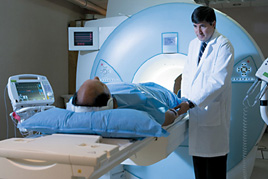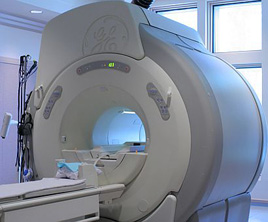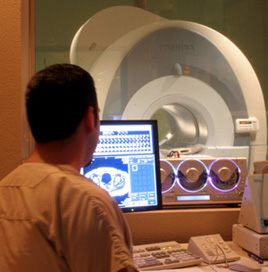 MRI
MRI
What is MRI?
Magnetic resonance imaging, or MRI, uses strong magnet and radio waves to provide clear and detailed diagnostic images of internal body organs and tissues. MRI is a valuable tool for the diagnosis of a broad range of conditions, including:
- cancer
- heart and vascular disease
- stroke
- joint and musculoskeletal disorders
MRI allows evaluation of some body structures that may not be as visible with other diagnostic imaging methods.
What are some common uses of MRI?
Imaging of the Musculoskeletal System: MRI is often used to study the knee, ankle, foot, shoulder, elbow, wrist, and hand. MRI is also a highly accurate method for evaluation of soft tissue structures such as tendons and ligaments, which are seen in great detail. Even subtle injuries are easily detected. In addition, MRI is used for the diagnosis of spinal problems including disc herniation, spinal stenosis, and spinal tumors.
MRIImaging of the Heart: MRI of the heart, aorta, coronary arteries, and blood vessels is a tool for diagnosing coronary artery disease and other heart problems. Doctors can examine the size and thickness of the chambers of the heart and determine the extent of damage caused by a heart attack or heart disease.
Imaging for Cancer & Functional Disorders: Organs of the chest and abdomen such as the liver, lungs, kidney, and other abdominal organs can be examined in great detail with MRI. This aids in the diagnosis and evaluation of tumors and functional disorders. In the early diagnosis of breast cancer, MRI is an alternative to traditional x-ray mammography. Furthermore because there is no radiation exposure is involved, MRI is often used for examination of the male and female reproductive systems.
How should I prepare for an MRI?
- Before your MRI exam, remove all accessories including hair pins, jewelry, eyeglasses, hearing aids, wigs, dentures. During the exam, these metal objects may interfere with the magnetic field, affecting the quality of the MRI images taken.
- Notify your technologist if you have:
- any prosthetic joints – hip, knee
- a heart pacemaker (or artificial heart valve), defibrillator or artificial heart value
- an intrauterine device (IUD),
- any metal plates, pins, screws, or surgical staples in your body.
- tattoos and permanent make-up.
- a bullet or shrapnel in your body, or ever worked with metal.
- if you might be pregnant or suspect you may be pregnant.
- if you are claustrophobic. Some patients who undergo MRI in an enclosed unit may feel confined. If you are not easily reassured, a sedative may be administered.





